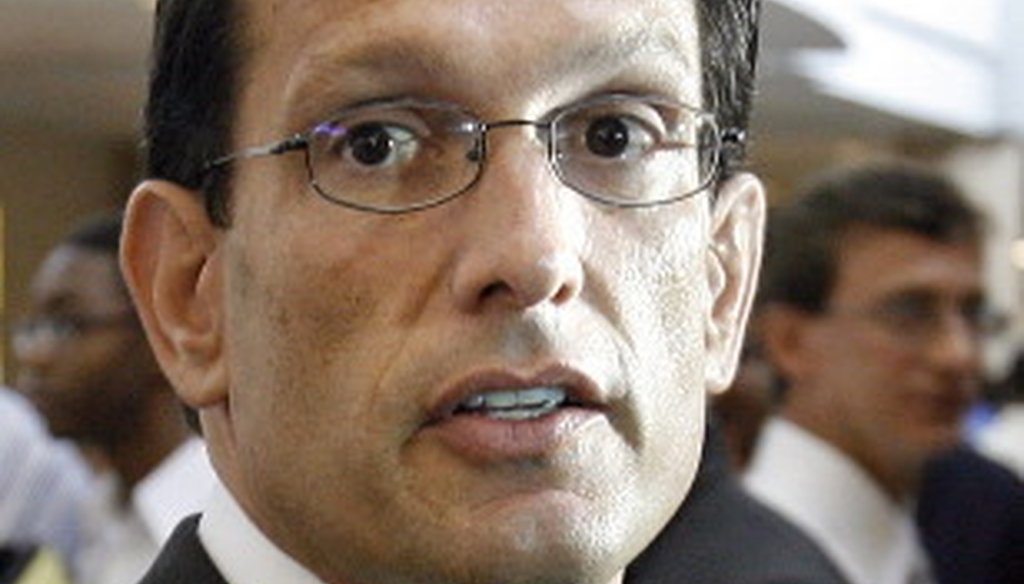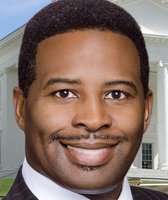Stand up for the facts!
Our only agenda is to publish the truth so you can be an informed participant in democracy.
We need your help.
I would like to contribute

House Majority Leader Eric Cantor's office urged us to reconsider a Mostly False rating we gave to one of his Obamacare statements in 2012.
President Barack Obama and House Majority Leader Eric Cantor have diametrically opposite views on the Affordable Care Act.
But does that mean that when Obama is proven wrong on a statement he made about the health care act, a contradictory claim made by Cantor, R-7th, must be true?
Cantor’s office made that argument last month in asking us to reconsider a Mostly False ruling issued on July 16, 2012 to the congressman’s claim that because of Obamacare, "The people who have health care and like it in this country are not going to be able to keep what they have."
Megan Whittemore, Cantor’s press secretary, noted that PolitiFact’s national bureau awarded its 2013 "Lie of the Year" to Obama for saying, "If you like your health care plan, you can keep it."
Whittemore, in a Feb. 5 email to PolitiFact Virginia, wrote that our "Mostly False rating of Congressman Cantor regarding Americans losing their health insurance because of Obamacare, which was deemed PolitiFact’s 'Lie of the Year,' is still up even though you now admit it is true."
Sign up for PolitiFact texts
So we examined whether the rulings on the statements by Obama and Cantor are inconsistent.
The president
Obama initially made his "like it, keep it" statement during his 2008 campaign and PolitiFact National gave it a Half-True rating, saying it was likely at least some employers would change plans and that it was too early to know how things would play out. The president repeated his assurance at least 37 times, according to PolitiFact, including during the 2012 campaign.
Obama’s claim unraveled last October when insurers began sending 2014 cancellation notices to people who buy their own insurance -- as opposed to getting it through an employer. The policies were being eliminated because they did not meet minimum coverage standards in the ACA. No one knows how many people got notices because the health insurance market is largely private and fragmented. The Washington Post and NBC News reported last fall that their sources estimated between 7 million and 12 million people might be affected.
That’s a significant number, even though it’s a small percentage of the 262 million people who are insured -- either privately, through employers, or through Medicare or Medicaid.
But Obama offered no qualifications when he repeatedly assured Americans that if they liked their insurance, they could keep it. And for more than a month after the cancellations began, Obama and his team didn’t budge from the claim.
First, they tried to blame insurers. "Fact: Nothing in #Obamacare forces people out of their health plans," tweeted Valerie Jarrett, a top adviser to the president, on Oct. 28. PolitiFact rated her statement False.
Then Obama tried to rewrite his slogan, telling supporters on Nov. 4, "If you had one of these plans before the Affordable Care Act came into law, and you really liked that plan, what we said was you can keep it if it hasn’t changed since the law passed." That got a Pants on Fire.
Three days later, Obama began to apologize for the "assurances" he gave people about keeping their coverage plans. He offered insurers the option of renewing the substandard policies for an additional year. The president extended the deadline again last week, giving insurers until Oct 1, 2016 to end the inadequate policies.
The bottom line is that millions who may like their insurance do, in fact, lose it under Obamacare. The president, for long insisting otherwise, was tagged with PolitiFact’s "Lie of the Year."
The majority leader
Cantor also offered no qualifications when he told Bloomberg News in mid-2012 that because of Obamacare, "The people who have health care and insurance and like it in this country are not going to be able to keep what they have."
Back then, Cantor’s office said the statement was based on a contention that the law encouraged businesses to stop providing health insurance to employees. Let’s explain.
According to the Kaiser Family Foundation, the average insurance premium for a single employee last year was $5,884, with the company paying $4,885 and the worker contributing $999. The average cost for a family policy was $16,351, with the company picking up $11,786 and the worker paying $4,565.
Obamacare will require all companies with 50 or more employees to provide healthcare to workers and families or pay a $2,000 per-worker tax, not counting the first 30 employees. Companies must pay a $3,000 per-worker tax for employees who qualify for government subsidies to buy insurance.
Cantor has long predicted that many companies will find it economical to drop insurance coverage and pay the penalty. Two years ago, his office sent us a Republican House report concluding that Fortune 100 companies would collectively save at least $28.6 billion by dropping their employee insurance plans in 2014.
Cantor’s office also told us then that a 2011 study by the Deloitte Center for Health Solutions found that up to 65 million people could lose employee-based insurance by the end of the decade because of Obamacare.
In that scenario -- the bleakest of nine provided in two Deloitte reports that year -- the center assumed that 25 percent of large companies and 50 percent of smaller ones would cancel insurance to save money.
Mercer, a global consulting firm, surveyed 2,842 public and private U.S. employers lin 2013, asking whether they were "very likely" or "likely" to stop offering health coverage during the next five years. It received positive responses from 23 percent of employers with 50-199 workers, 12 percent of employers with 200-499 workers, and 6 percent employers with 500 or more workers.
In considering the overall ramifications of these findings, weight has to be attached to the responses of large companies because they pay about 71 percent of the workers that could be affected by Obamacare’s employer mandate. The midsize companies employ about 11 percent of the workers and the smaller companies about 18 percent.
When we reviewed Cantor’s claim in 2012, we noted that Obamacare studies by five other non-partisan organizations ranged from predicting 5 million workers would lose their employer-based coverage to 4 million new workers would gain it.
The Congressional Budget Office, in a study last May, estimated that Obamacare will cause 11 million people to lose their employer-based insurance by 2019. That comes to 7 percent of the 157 million people in U.S. now covered through workplaces. The loss will be somewhat offset, the agency said, by an estimated 7 million people who will gain employer insurance because of the law.
Why would companies largely continue to offer health coverage when it appears thriftier to drop the plans and pay the penalty tax? Analysts say there are economic and competitive reasons.
For starters, businesses that cancelled insurance would lose a big tax break. That’s because every penny companies spend on health coverage is deductible.
Let’s take a look at the financial considerations of a company thinking about canceling insurance. The business initially would save an average of $4,885 for each individual policy it ended. But then it would lose the federal tax break on the policy which, depending on the corporate rate paid by the company, could be worth as much as $1,710. It also would likely lose a much smaller deduction on its state taxes. On top of that, the company would pay a non-deductible federal penalty of $2,000.
A business also would face lost tax breaks and potential penalties for each family policy it dropped. The difference is that because the average employer contribution to a family policy is $11,786, a company would easily come out ahead on the balance sheet by canceling the policy -- perhaps by as much as $8,000.
But any savings could come at a long-term price, according to Paul Fronstin, director of health research at the Employee Benefit Research Institute, a nonpartisan organization supported by corporations and some labor groups. Fronstin noted that businesses have long offered health insurance as part of compensation packages. Eliminating the benefit, he said, would undercut a company’s ability to retain and recruit top employees. That, in turn, could hurt sales and productivity.
A similar conclusion was offered by Doug Jones, senior director with Fahrenheit Finance, a Richmond-based business consulting firm. "It will be hard for companies to compete if they’re one of a few in a field that’s saying, 'No, we can’t offer health coverage,'" he said.
Ted Marmor, a professor of health policy at Yale University, said unionized companies would have no incentive to end health insurance. "To the extent that they cut out coverage, unions will demand pay raises," he said. "It all comes out of the same pool and I’m sure it would be a matter of negotiation."
Christine Eibner, a senior economist at the Rand Corp., said she doesn’t buy the argument that Obamacare encourages businesses to drop health insurance. She noted there has been no concerted move by companies to cancel coverage during all the years there has been no federal fine for doing so. The imposition of the $2,000 penalty, she said, should further discourage most companies from ending coverage.
Remember, the employer mandate under Obamacare applies to companies with 50 or more workers. Analysts say the smaller the company, the more likely it is to consider dropping insurance.
There’s one more subject that should be addressed. Vast numbers of workers will see their insurance change for reasons that are not connected to Obamacare. It’s common for employers and their insurance companies to alter their plans. A survey last fall by Mercer found that 18 percent of large companies anticipated making policy changes this year that will result in employees paying a greater share toward family coverage, and 10 percent expected to do so for individual coverage.
"Those trends began years before the ACA was passed," Sabrina Corlette, program director at Georgetown University’s Center of Health Insurance Reforms, wrote us in a recent email.
Of Cantor’s claim, Corlette wrote, "It’s an overstatement, to say the least. The vast majority of people who had health insurance pre-ACA, whether through an employer or a public program like Medicare, are going to see no change as a result of the ACA."
Robert Laszewski, a health insurance consultant and head of Health Policy and Strategy Associates, also was dismissive of Cantor’s claim. "It’s a blanket statement and I don’t think it’s fair," he said. "There’s a mixed bag of things happening on the insurance market."
"It’s just the perfect example of an over-generalized tenet," Marmor, the professor of health policy at Yale, said of Cantor’s statement. "The scope of the problem is not anywhere near the scope that he described."
Marmor also addressed the contention of Cantor’s office that because the president’s statement on Obamacare has been proven wrong, the majority leader’s statement is correct. "It’s an argument that because x is false, y must be true," he said. "In my class, if you write that, you fail."
Our conclusion
Both Obama and Cantor made overly broad statements. Last fall, the president finally rescinded his claim that the ACA allowed everyone who liked their insurance to keep it. But that didn’t legitimize the congressman’s opposite claim that because of Obamacare, "The people who have health care and like it in this country are not going to be able to keep what they have."
Cantor’s claim allowed for no exceptions. It suggested that everyone who liked their coverage will lose it because of Obamacare.
No doubt, the ACA will force changes. The media has published estimates that up to 12 million will lose their privately-purchased health insurance because their policies will fall below Obamacare standards. The CBO projects that another 11 million will lose their employer-based insurance during over 10 years.
Adding those figures, you come up with 23 million. That’s a big number, but it must be put perspective. It’s less than 9 percent of 262 million people in the U.S. who now have health insurance. Most people are insured by employers and analysts told us there are compelling reasons for companies to continue offering policies. Businesses that cancel coverage, they said, will have a hard time recruiting and retaining top employees.
Other workers will see changes in their health plans that are not tied to Obamacare. For more than a decade, companies have been requiring employees to pay a steadily increasing share of their health care costs.
In mid-2012, we rated Cantor’s sweeping statement Mostly False. That ruling still holds up today.
Our Sources
Email from Megan Whittemore, press secretary for U.S. Rep. Eric Cantor, Feb. 5, 2014.
PolitiFact Virginia, "Cantor says that under the health care law, the people who like their insurance will lose `what they have’," July 16, 2012.
PolitiFact, "Lie of the Year: `If you like your health care plan, you can keep it,’" Dec. 12, 2013.
The White House, "Remarks by the president in insurance reform town hall," Aug. 11, 2009.
PolitiFact, "Barack Obama promises you can keep your health insurance, bu there’s no guarantee," Aug. 11, 2013.
NBC News, "Obama administration knew millions could not keep their health insurance," Nov. 22, 2013.
The Washington Post, "This is why Obamacare is canceling some people’s insurance plans," Oct. 29, 2013.
PolitiFact, "Valerie Jarrett says ‘nothing in Obamacare forces people out of their health plans,’" Oct. 30, 2013.
Bloomberg News, "Leader Cantor tells Bloomberg: `We believe in patient-centered care,’" June 29, 2012.
Kaiser Family Foundation, "2013 Employer Health Benefits Survey," Aug. 20, 2013.
Kaiser Family Foundation, "2010 Employer Health Benefits Survey."
House Ways of Means Committee Majority Staff, "Broken Promise: Why Obamacare will force Americans to lose the health care coverage they have and like," May 1, 2012.
Deloitte Center for Health Solutions, "The Impact of Health Reform on the Individual Insurance Market," 2011.
Deloitte Center for Health Solutions, "Health Reform Update," Aug. 1, 2011.
Congressional Budget Office, "Estimate of the Effects of the Affordable Care Act on Health Insurance Coverage," May 2013.
Mercer, "U.S. health benefit cost growth slowed again in 2013, but employers expect that growth will change in 2014," Nov. 20, 2013.
Email interviews with Stephanie Poe, spokeswoman for Mercer, Feb. 25 and 26, 2014.
Email interview with Sabrina Corlette, program director at Georgetown University’s Center of Health Insurance Reforms, Feb. 18, 2014.
Interview with Robert Laszewski, a health insurance consultant and head of Health Policy and Strategy Associates, Feb. 17, 2014.
Interview with Ted Marmor, professor of health policy at Yale University, Feb. 18, 2014.
Interview with Christine Eibner, senior economist at Rand Corp., March 4, 2014.
Interview with Doug Jones, senior director with Fahrenheit Finance, March 5, 2014.
Small Business Administration, "Statistics of U.S. Businesses," 2010.








































